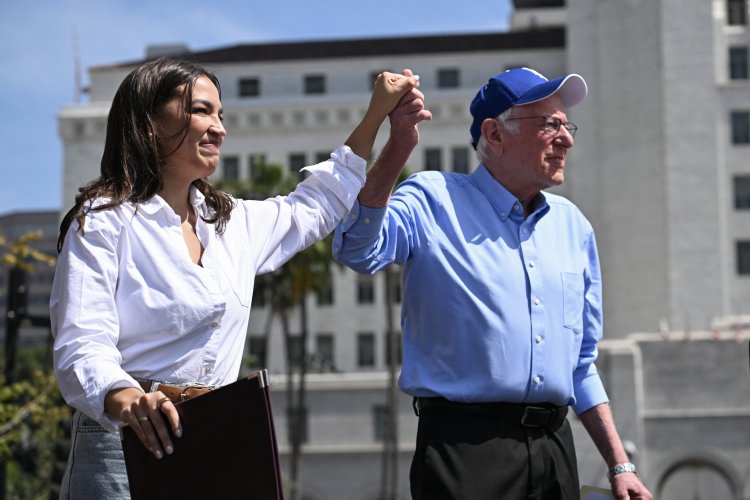Bernie Sanders Attracts Large Audiences, Yet Faces Progressive Challenges in California.
A senior organizer from the Working Families Party remarked, “It’s very obvious that we haven’t done enough,” highlighting a need for increased efforts.

Progressive efforts in California to implement single-payer healthcare and other ambitious policy goals have largely stalled. Key Democratic figures, including Governor Gavin Newsom and several ambitious mayors from major cities, have shifted toward the center. On Tuesday in Oakland, the esteemed progressive Barbara Lee faces a surprisingly tight race for mayor against a more moderate Democrat.
“Bernie's victory in California was huge,” remarked Mike Bonin, a progressive former Los Angeles city council member and incoming director of the Pat Brown Institute for Public Affairs at California State University Los Angeles. “But it hasn't had a permanent impact on California politics.”
The massive turnout in Los Angeles — Sanders estimated 36,000 attendees, claiming it was the largest crowd he has ever attracted — showcased the Vermont senator's lasting appeal. Yet his arrival at this site, which marked one of his most significant political victories five years ago, also highlighted the movement's ongoing challenges.
In California, a stronghold for Democrats, the progressive movement has seen its influence diminish during the Trump era. Progressive priorities are now contested not only by conservatives but also by centrists who blame the left for rising homelessness and crime. Many California Democrats find themselves focused on maintaining their existing gains amid significant threats to federal funding from President Donald Trump, along with an uptick in deportations and tough rhetoric on crime.
As he addressed the throngs who filled Los Angeles’ Grand Park and congregated on the steps of City Hall for his “Fighting Oligarchy” tour alongside Rep. Alexandria Ocasio-Cortez, Neel Sannappa, a senior organizer with the Working Families Party, urged Sanders to help channel the enthusiasm into a more sustainable progressive movement in the state.
“Come to the Democratic Party convention, be our guests at the progressive caucus and really stir some stuff up,” Sannappa said, who is also a candidate for the chair of the party's progressive caucus. “Because we need to be doing something different. It’s very obvious that we haven’t done enough, we haven’t built enough, we haven’t reached out to communities.”
Winning the 2020 California Democratic primary was a crowning achievement for Sanders, illustrating not only his appeal but also the potential of his movement.
“It showed the party and the world that his message and his appeal, with a populist economic progressive message, can win a large, diverse state and can draw a broad, diverse coalition,” noted Ben Tulchin, a Democratic pollster who collaborated on Sanders’ campaigns in 2016 and 2020. “It was hugely important.”
Sanders’ rise sent shockwaves through California’s political landscape, sparking a surge of new activism from the left as progressives gained ground in previously insider-dominated party elections. Sanders' Medicare for All initiative became a central theme in the 2018 governor’s race, where then-candidate Newsom embraced the progressive mantle as a champion for healthcare reform.
Yet, efforts to establish a statewide single-payer system faltered, with Newsom diverting from his campaign promises once in office. The push for statewide rent control similarly stumbled, as voters turned down multiple ballot measures aimed at more renter-friendly policies. Progressives struggled in attempts to unseat numerous entrenched Democrats or hold moderate politicians like Newsom accountable. Their efforts to elect one of their own to the leadership of the state Democratic Party failed multiple times, and their threats of primary challenges against Democrats who opposed single-payer legislation went unheeded. Meanwhile, they alienated many constituents, leading to the election of a more moderate mayor in San Francisco and the ouster of progressive district attorneys in both Oakland and Los Angeles.
"California is much more a machine state than people realize. Bernie Sanders broke through on a presidential level with his vision and conviction,” expressed Democratic Rep. Ro Khanna, a former co-chair of Sanders’ campaign and one of the few national figures seen as a potential successor to his movement. “That has not translated yet on a local or state level. It's going to take more people winning at the congressional level, at the state Assembly level, at the governor level.”
For progressive Democrats in California, that has proven to be a significant hurdle.
“The formula we haven't figured out in California is that while our values are progressive, we have a lot of big money here,” stated Fatima Iqbal-Zubair, who heads the progressive caucus in the state Democratic Party and criticized the influence of wealthy interest groups.
Iqbal-Zubair, who had lost two races against an incumbent Democrat for a Los Angeles-area Assembly seat, pointed out that getting rid of candidates with substantial fundraising advantages is one of the biggest challenges for up-and-coming progressives like herself. This year, running for an open seat following the incumbent's term limit, she still sees it as a formidable challenge.
“I’m running as a progressive in a district with a lot of industry, oil, and police interests,” she said.
There have been some bright spots for progressives, especially in local elections; in Los Angeles, a left-leaning group of city council members, two of whom joined Sanders on stage, have gained traction by defeating several incumbents.
During the rally, Sanders criticized Trump’s billionaire adviser Elon Musk, a frequent target for the left, while reiterating familiar themes about wealth inequality and the sway of special interests. His steadfast message has earned him unique credibility among progressives.
In a post-rally interview, Sanders reiterated that the progressive movement extends beyond his own persona, emphasizing its grassroots nature — “I am not a modest person, but it’s not me. It is millions of people who are angry” — and ascribed the movement's setbacks in California and elsewhere to potent opposition forces.
“Look, the opposition to Medicare for All, to lowering the cost of prescription drugs is enormous. What can I say? These oligarchs have enormous power,” he emphasized. “Our job is to grow a movement to make them an offer they can’t refuse. We’re going to win.”
Still, Jane Kim, who leads the left-leaning Working Families Party in California and directed Sanders’ California campaign in 2020, acknowledged that the “million dollar question” for progressives is how to expand their victories “beyond the rock stars” like Sanders and Ocasio-Cortez. Reviving a struggling brand in California will be essential for this effort.
Lorena Gonzalez, head of the California Labor Federation, asserted that progressives “absolutely” wasted the momentum gained during the initial years of Sanders’ ascent.
“We had a supermajority. There was so much we could’ve done and so often, it felt like I was fighting over my own colleagues to try to advance an economically progressive agenda,” remarked Gonzalez, who was in the Assembly during the height of Sanders-inspired activism.
Even in the progressive stronghold of San Francisco, Sal Rosselli, founder of the National Union of Healthcare Workers based in the Bay Area, noted that the term “progressive” has taken on negative connotations, as a more centrist, business-friendly faction has commandeered the city's political establishment.
“They took over the Democratic party with huge dollars and made the word ‘progressive’ a huge negative, pinning it to allowing crime,” Rosselli lamented.
Public safety and crime — areas that were never central to Sanders’ economy-focused agenda — have emerged as significant vulnerabilities for California's progressives. A spike in crime during the pandemic led to the removal of progressive district attorneys in major cities like San Francisco, Oakland, and Los Angeles. Furthermore, a statewide measure to increase penalties for certain drug and theft offenses received overwhelming approval last year, reflecting a stark rightward shift in California politics heading into 2024.
With upcoming gubernatorial elections, there may be some opportunities for progressives to assert themselves. Yet, none of the current Democratic contenders have boldly embraced the mantle of Sanders’ movement.
Katie Porter, the former representative from Orange County, is perhaps the closest to Sanders' ideology, known for her association with Massachusetts Senator Elizabeth Warren and her consistent stance against corporate influence. However, in her campaign launch video, she also positioned herself as a pragmatic consensus builder who seeks to collaborate with businesses while protecting workers — a stark contrast to Sanders’ more confrontational approach.
Kim, from the Working Families Party, anticipated that many Democratic candidates in the race would ultimately lean left, adopting the successful strategy that propelled Newsom into office. Yet she cautioned, “What they'll do when they're in office is very different from what they will campaign on, and that is the challenge.”
“It's not like we're gonna suddenly see the next Bernie Sanders of the governor's race of 2026 in California,” she observed. “I think that will take time.”
Navid Kalantari for TROIB News












